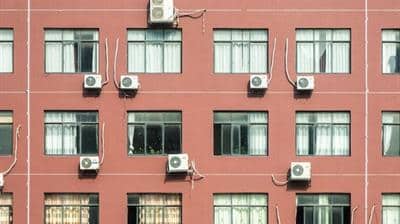
Air conditioning is a common feature in most homes and workplaces. It keeps us cool during hot summer months and helps regulate temperature all year round. However, air conditioning can also have a significant impact on indoor air quality (IAQ). In this article, we explore some of the ways that air conditioning affects IAQ.
Reduced Ventilation
One of the primary ways that air conditioning impacts IAQ is by reducing ventilation. When we use AC systems, we typically close windows and doors to keep the cool air inside. This limits fresh air intake from outside and traps pollutants and allergens indoors.
The consequences of reduced ventilation can be significant. Pollutants such as dust mites, pet dander, and pollen can build up in indoor spaces over time. This can cause respiratory problems such as asthma or allergies.
To mitigate these effects, it’s important to ensure proper ventilation in your home or workplace. Opening windows when possible or using an exhaust fan can help bring fresh air into your space.
Increased Humidity
Another way that air conditioning impacts IAQ is by increasing humidity levels. AC systems work by removing moisture from the air to lower temperatures. While this can be beneficial for comfort, it can also create an environment where mold and bacteria thrive.
Mold thrives in humid environments where there is excess moisture present. If left unchecked, mold growth can cause health problems such as respiratory issues or skin irritation.
To prevent mold growth caused by increased humidity levels due to AC use, it’s important to monitor your home’s relative humidity levels regularly. Keeping them below 60% will help prevent mold growth while still maintaining comfortable temperatures.
Dirty Ducts and Filters
Dirty ducts are another issue that arises when using AC systems regularly without proper maintenance. Over time, dust and debris accumulate in ductwork which reduces airflow efficiency and contributes to poor IAQ.
Dirty filters are another culprit of poor IAQ caused by AC systems. Filters trap dust particles before they enter your living space but need regular cleaning or replacement to remain effective at filtering out pollutants.
To maintain good IAQ through proper maintenance of your HVAC system, clean filters regularly or replace them every few months, depending on usage levels.
Chemical Exposure
Finally, exposure to chemicals used in AC systems is yet another way that air conditioning affects IAQ negatively. Refrigerants used in cooling units contain chemicals known as hydrofluorocarbons (HFCs) which contribute significantly to climate change if released into the atmosphere accidentally.
Cleaning agents used for routine maintenance of HVAC systems also contain chemicals that pose risks when not handled correctly or disposed of properly after use.
To minimize chemical exposure associated with AC use, ensure all routine maintenance tasks are carried out by trained professionals who understand how to handle these chemicals safely.
Conclusion
In conclusion, understanding how air conditioning affects indoor air quality is essential for maintaining a healthy home or workplace environment. By ensuring proper ventilation through open windows or exhaust fans when possible; monitoring humidity levels; cleaning filters regularly; performing routine maintenance tasks; minimizing chemical exposure risks associated with HVAC use – you can reduce negative impacts on IAQ while still enjoying the benefits of cool indoor temperatures on hot days!
The post The Surprising Ways Air Conditioning Affects Your Indoor Air Quality appeared first on AC Service in Greater Phoenix AZ | Worlock Air Conditioning Specialists.